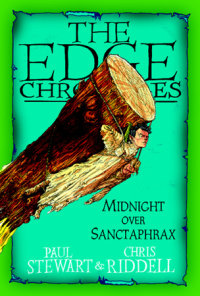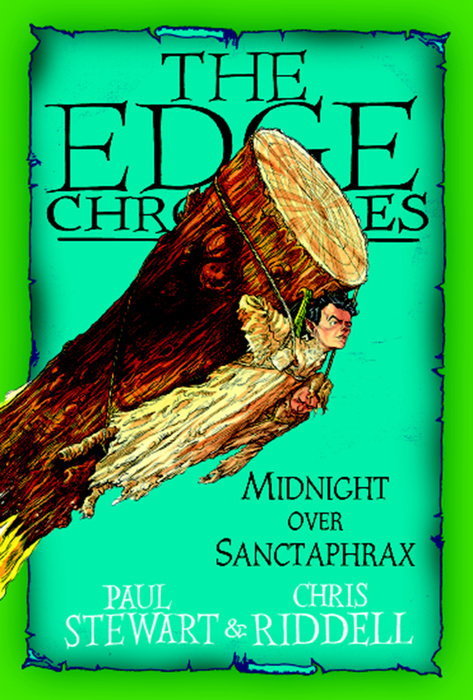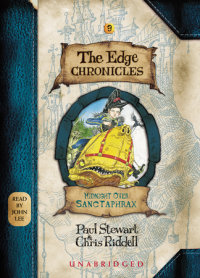Edge Chronicles: Midnight Over Sanctaphrax
Edge Chronicles: Midnight Over Sanctaphrax is a part of the The Edge Chronicles collection.
THE TWIG TRILOGY, Book III
Out in the open sky, a ferocious storm threatens the magnificent floating city of Sanctaphrax. Only Twig, who has dared to sail over the Edge, knows of the approaching danger. But before he can return home, his sky ship is destroyed, scattering his crew across the world and robbing him of all memory. Without Twig, will the Edge be lost forever?
An Excerpt fromEdge Chronicles: Midnight Over Sanctaphrax
The Snatchwood Cabin
Twig sat on the floor between his mother’s knees, and curled his toes in the thick fleece of the tilder rug. It was cold and draughty in the cabin. Twig leaned forwards and opened the door of the stove.
‘I want to tell you the story of how you got your name,’ his mother said.
‘But I know that story, Mother-Mine,’ Twig protested.
Spelda sighed. Twig felt her warm breath on the back of his neck, and smelled the pickled tripweed she had eaten for lunch. He wrinkled his nose. Like so much of the food which the woodtrolls relished, Twig found tripweed disgusting, particularly pickled. It was slimy and smelled of rotten eggs.
‘This time it will be a little different,’ he heard his mother saying. ‘This time I will finish the tale.’
Twig frowned. ‘I thought I’d already heard the ending.’
Spelda tousled her son’s thick black hair. He’s grown so fast, she thought, and wiped a tear from the end of her rubbery button-nose. ‘A tale can have many endings,’ she said sadly, and watched the purple light from the fire gleaming on Twig’s high cheekbones and sharp chin. ‘From the moment you were born,’ she began, as she always began, ‘you were different . . .’
Twig nodded. It had been painful, so painful, being different when he was growing up. Yet it amused him now to think of his parents’ surprise when he had appeared: dark, green-eyed, smooth-skinned, and already with unusually long legs for a woodtroll. He stared into the fire.
The lufwood was burning very well. Purple flames blazed all round the stubby logs as they bumped and tumbled around inside the stove.
The woodtrolls had many types of wood to choose from and each had its own special properties. Scentwood, for instance, burned with a fragrance that sent those who breathed it drifting into a dream-filled sleep, while wood from the silvery-turquoise lullabee tree sang as the flames lapped at its bark — strange mournful songs, they were, and not at all to everyone’s taste. And then there was the bloodoak, complete with its parasitic sidekick, a barbed creeper known as tarry vine.
Obtaining bloodoak wood was hazardous. Any woodtroll who did not know his woodlore was liable to end up satisfying the tree’s love of flesh — for the bloodoak and the tarry vine were two of the greatest dangers in the dark and perilous Deepwoods.
Certainly the wood of the bloodoak gave off a lot of heat, and it neither smelled nor sang, but the way it wailed and screamed as it burned put off all but a few. No, among the woodtrolls, lufwood was by far the most popular. It burned well and they found its purple glow restful.
Twig yawned as Spelda continued her story. Her voice was high-pitched but guttural; it seemed to gurgle in the back of her throat.
‘At four months you were already walking upright,’ she was saying, and Twig heard the pride in his mother’s words. Most woodtroll children remained down on their knuckles until they were at least eighteen months old.
‘But . . .’ Twig whispered softly. Drawn back inside the story despite himself, he was already anticipating the next part. It was time for the ‘but’. Every time it arrived Twig would shudder and hold his breath.
‘But,’ she said, ‘although you were so ahead of the others physically, you would not speak. Three years old you were, and not a single word!’ She shifted round in her chair. ‘And I don’t have to tell you how serious that can be!’
Once again his mother sighed. Once again Twig screwed up his face in disgust. Something Taghair had once said came back to him: ‘Your nose knows where you belong.’ Twig had taken it to mean that he would always recognize the unique smell of his own home. But what if he was wrong? What if the wise old oakelf had been saying — in his usual roundabout way — that because his nose didn’t like what it smelled, this was not his home?
Twig swallowed guiltily. This was something he had wished so often as he’d lain in his bunk after yet another day of being teased and taunted and bullied.
Through the window, the sun was sinking lower in the dappled sky. The zigzag silhouettes of the Deepwood pines were glinting like frozen bolts of lightning. Twig knew there would be snow before his father returned that night.
He thought of Tuntum, out there in the Deepwoods far beyond the anchor tree. Perhaps at that very moment he was sinking his axe into the trunk of a bloodoak. Twig shuddered. His father’s felling tales had filled him with deep horror on many a howling night. Although he was a master carver, Tuntum Snatchwood earned most of his money from the illicit repair of the sky pirates’ ships. This meant using buoyant wood — and the most buoyant wood of all was bloodoak.
Twig was uncertain of his father’s feelings towards him. Whenever Twig returned to the cabin with a bloodied nose or blacked eyes or clothes covered in slung mud, he wanted his father to wrap him up in his arms and soothe the pain away. Instead, Tuntum would give him advice and make demands.
‘Bloody their noses,’ he said once. ‘Black their eyes. And throw not mud but dung! Show them what you’re made of.’
Later, when his mother was smoothing hyleberry salve onto his bruises, she would explain that Tuntum was only concerned to prepare him for the harshness of the world outside. But Twig was unconvinced. It was not concern he had seen in Tuntum’s eyes but contempt.
Twig absent-mindedly wound a strand of his long, dark hair round and round his finger as Spelda went on with her story.
Excerpted from Beyond the Deepwoods by Paul Stewart and Chris Riddell. Text and illustrations copyright © 2004 by Paul Stewart and Chris Riddell. Excerpted by permission of David Fickling Books, a division of Random House, Inc. All rights reserved. No part of this excerpt may be reproduced or reprinted without permission in writing from the publisher.


